Stainless steel sinks are a popular choice for kitchens due to their durability and sleek appearance. However, they can become tarnished with hard water stains over time, leaving them looking dull and dirty. In this guide, we will discuss how to remove hard water stains from stainless steel sinks and restore their shine.
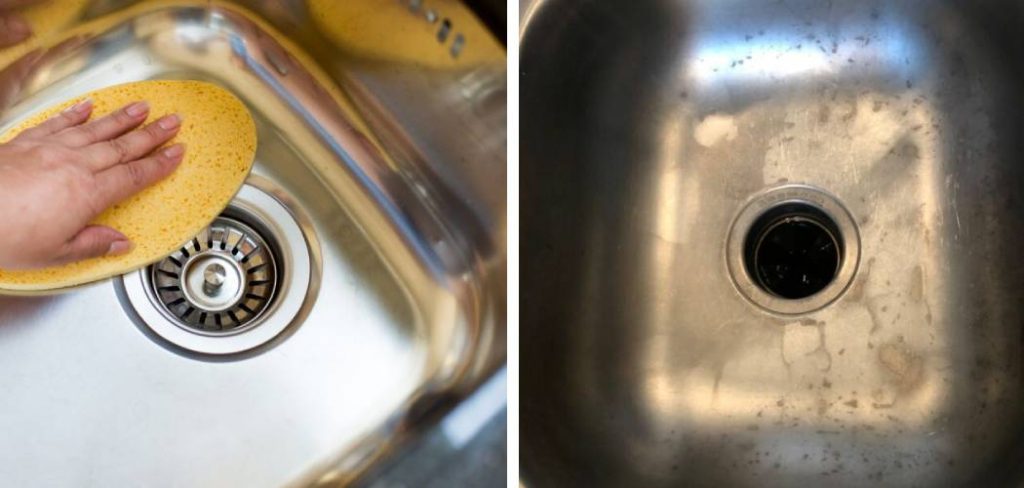
What Causes Hard Water Stains?
Hard water stains are caused by the mineral deposits left behind when water evaporates from a surface. These minerals, such as calcium and magnesium, can build up over time and create a hazy, white film on stainless steel sinks. This is especially common in areas with hard water, which contains higher levels of these minerals.
Supplies You Will Need
Before you begin removing hard water stains from your stainless steel sink, gather the following supplies:
- White vinegar
- Baking soda
- Lemon juice or lemon essential oil
- Soft cloth or sponge
- Microfiber towel
10 Effective Ways on How to Remove Hard Water Stains From Stainless Steel Sink
If you’ve noticed unsightly stains in your stainless steel sink, hard water could be the culprit. Those minerals can accumulate over time, leaving your sink looking dull and dirty. Fortunately, there are several methods to restore its sparkle without damaging the stainless steel. Here are ten proven techniques to banish hard water stains and keep your kitchen looking its best.
1. Vinegar and Water Solution
White vinegar is a natural powerhouse against hard water stains. Create a solution of equal parts vinegar and water, and apply it directly to the sink. Let it sit for a few minutes before scrubbing with a non-abrasive pad, followed by a thorough rinse. The acetic acid acts as a gentle abrasive against mineral deposits, leaving behind a brilliant shine.
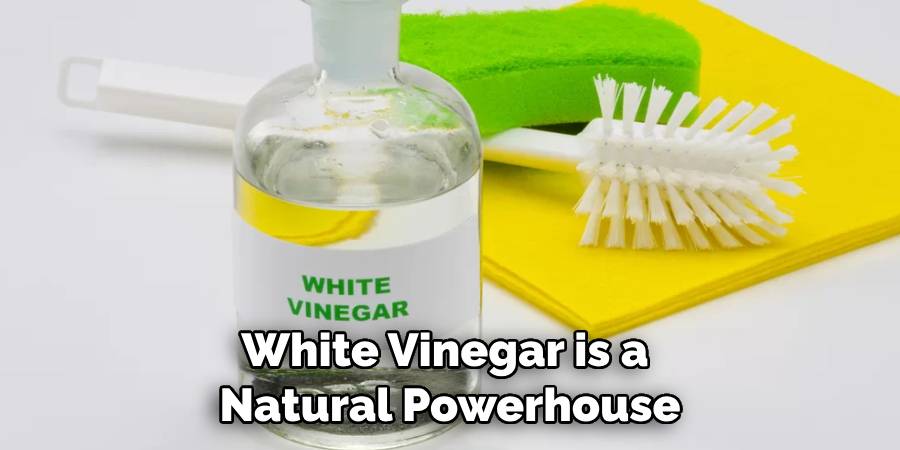
2. Baking Soda Paste
Mix baking soda with a little water to form a paste, which is slightly abrasive and ideal for stubborn stains. Apply it to the sink and scrub in a circular motion using a soft cloth or sponge. The gentle abrasive action helps lift the stains without scratching the steel. Rinse well with water to reveal a beautiful, clean sink.
3. Lemon Juice Magic
Lemon juice is another natural remedy for hard water stains. The citric acid in lemon juice can break down tough stains with ease. Cut a lemon in half, sprinkle some salt on the cut side, and use it to scour the sink. The salt provides additional abrasiveness, while the lemon’s acidity helps dissolve the minerals. Rinse thoroughly to remove any residual lemon juice and admire your gleaming sink.
4. Commercial Stainless Steel Cleaner
If you prefer a commercial solution, there are many stainless steel cleaners designed specifically to tackle hard water spots. Look for non-abrasive formulas to protect your sink’s finish. Follow the product instructions carefully, usually involving spraying the cleaner, letting it sit, and then wiping it off. You may need to repeat the process for deep or stubborn stains.
5. Cola for Quick Results
Cola contains phosphoric acid, which can effectively break down mineral deposits in a sink. Simply pour some cola into the stained areas and allow it to sit for a few minutes. Afterward, scrub the sink with a sponge or cloth to lift the marks. Rinse thoroughly to prevent stickiness, and be amazed at how quickly the stains disappear.
6. Rubber Gloves and Toothbrush
For a controlled, detail-oriented approach, don a pair of rubber gloves and use an old toothbrush to scrub areas with heavy hard water deposits. The manual action targets specific spots, allowing you to apply extra pressure without scuffing the stainless steel. Dip the toothbrush in a mild cleaning solution like vinegar or lemon juice to enhance its effectiveness.
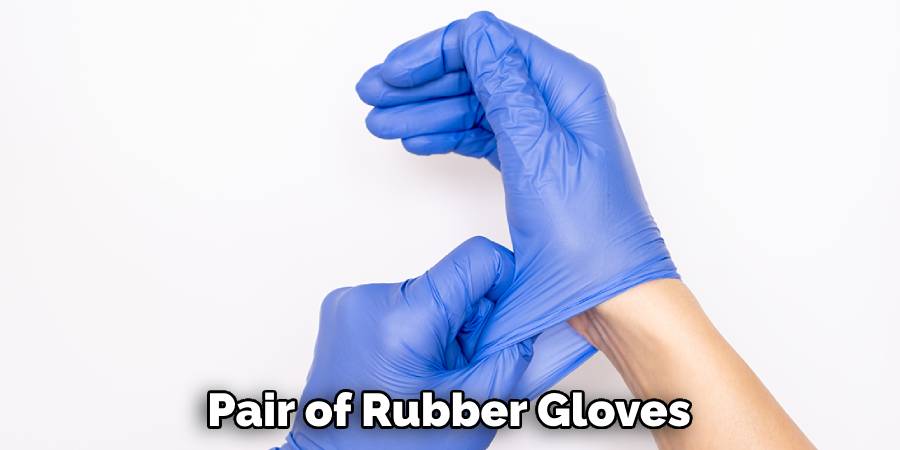
7. Magic Eraser for Tough Stains
Magic Erasers are excellent at removing hard water stains from stainless steel without harsh chemicals or abrasive scrubbing. Wet the eraser and gently rub the stained areas. The micro-scrubbers lift and remove mineral deposits without scratching the steel. Ensure you only use these on areas that are safe for light abrasion to avoid damage.
8. Cream of Tartar Paste
Create a paste with cream of tartar and a little water, then apply it to the stains in your sink. The mild acidic properties make it a great alternative to lemon or vinegar. Scrub the paste into the stains with a soft cloth, being careful not to use too much pressure. Rinse thoroughly to reveal a spotless basin.
9. DIY Cleaning Tabs
DIY cleaning tabs can be created using a combination of baking soda, hydrogen peroxide, and vinegar (or lemon juice). Mix the ingredients until you form a thick paste, then spoon this mixture into an ice cube tray. After they dry, you’ll have cleaning tabs you can just pop out and use by placing them in the stained areas and allowing them to fizz and work their magic.
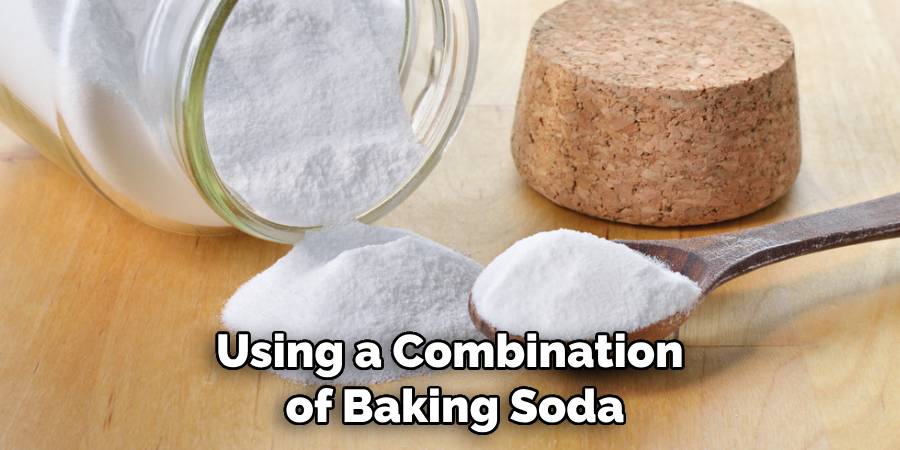
10. Boiling Water Flush
A simple yet effective approach for lighter stains involves pouring boiling water over the affected area. The sudden temperature change can help loosen mineral deposits and allow them to be flushed away. For best results, repeat the pour several times, letting the sink cool between applications to prevent scalding yourself and protect your stainless steel.
Consistently managing hard water stains keeps your stainless steel sink looking great and can extend its lifespan. Remember, prevention is key, so try to dry your sink after use to avoid water spots and invest in a water softener system if you have particularly hard water. With these strategies, you’re well-equipped to maintain a sparkling kitchen centerpiece.
Common Causes of Hard Water Stains on Stainless Steel Sink
Hard water contains high levels of minerals such as calcium and magnesium, which can leave behind unsightly stains on your stainless steel sink. These minerals can build up over time, causing the surface to lose its shine and become dull. Hard water stains are most commonly caused by:
- Using hard water for cleaning dishes or washing food in the sink
- Not drying the sink after use, allowing water to evaporate and leave behind mineral deposits
- Using harsh or abrasive cleaners that can damage the stainless steel surface
- Not regularly cleaning or maintaining the sink, allowing stains to build up over time
If left untreated, hard water stains can become more challenging to remove and may even cause permanent damage to your sink. That’s why it’s essential to address them as soon as you notice them and regularly maintain your sink to prevent future buildup.
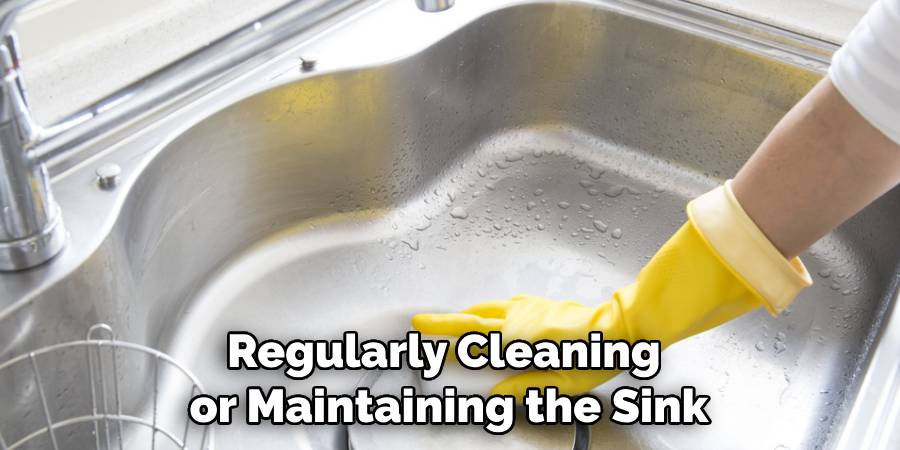
Preventing Hard Water Stains on Stainless Steel Sink
Although it’s relatively easy to remove hard water stains from a stainless steel sink, prevention is always better than cure. Here are some tips to help prevent hard water stains from appearing in the first place:
- Use a water softener system to reduce the amount of minerals in your tap water.
- Immediately dry your sink after use with a clean, soft cloth to prevent water spots from forming.
- Avoid using harsh or abrasive cleaners that can damage the stainless steel surface and cause more stains.
- Regularly clean and maintain your sink by following the methods outlined in this guide.
By incorporating these preventative measures into your cleaning routine, you can keep your stainless steel sink looking shiny and new for years to come. Plus, you’ll save time and effort in the long run by avoiding stubborn hard water stains. Remember, a little bit of prevention goes a long way! Finally, be sure to regularly check for leaks or other plumbing issues that may contribute to hard water buildup in your sink.
Frequently Asked Questions
What is the Best Cleaner for Hard Water on Stainless Steel Sink?
The battle against the blemish of hard water stains on the once shimmering surface of your stainless steel sink can feel like a never-ending struggle. Yet, with the right approach, victory is within reach. How to remove hard water stains from stainless steel sink becomes not just a question but a showcase of triumph over the dulling residue of daily use. It requires a concoction of household staples like white vinegar and baking soda, combined with a touch of elbow grease, to restore your sink to its former glory.
Effortlessly, the vinegar’s acetic acid works to dissolve the minerals, while the mild abrasion of baking soda polishes without scratching, revealing a gleam that revitalizes the heart of your kitchen. This simple yet effective method promises to transform your stainless steel sanctuary, ensuring that water’s touch leaves no trace, only the lustrous reflection of a well-maintained centerpiece.
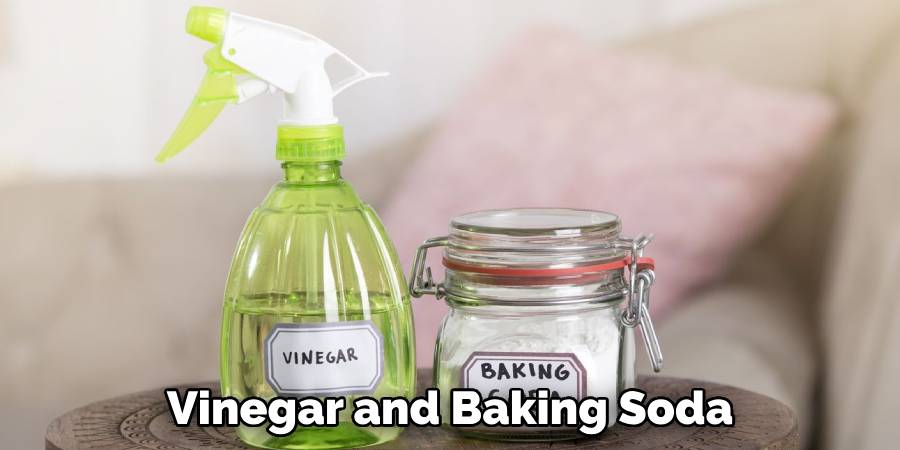
Can Hard Water Stains be Removed from Stainless Steel Sink?
Yes, hard water stains can be removed from a stainless steel sink with the right cleaning methods and materials. As mentioned earlier, using products like vinegar, baking soda, and lemon juice can effectively dissolve and remove mineral deposits from your sink’s surface. It’s essential to regularly clean and maintain your sink to prevent tough stains from building up over time.
Will Regular Cleaning Prevent Hard Water Stains on Stainless Steel Sink?
Yes, regular cleaning and maintenance can help prevent hard water stains from appearing on your stainless steel sink. It’s important to dry the sink after each use, avoid using harsh cleaners, and regularly clean the sink with gentle solutions like vinegar and baking soda to keep mineral deposits at bay. Additionally, investing in a water softener system can greatly reduce the amount of minerals in your tap water, making it less likely for hard water stains to form on your sink’s surface.
Conclusion
In this guide, we’ve discussed various methods for how to remove hard water stains from stainless steel sink and prevent them from reappearing. By incorporating these tips into your cleaning routine, you can keep your sink looking shiny and new while extending its lifespan. Remember to regularly maintain your sink and address any leaks or plumbing issues promptly to prevent future buildup.
With a little effort and the right techniques, you can maintain a sparkling stainless steel sink that will be the centerpiece of your kitchen for years to come! So don’t let hard water stains dull your sink’s shine – fight back with these simple yet effective methods and enjoy a beautiful, blemish-free sink. Happy cleaning!
